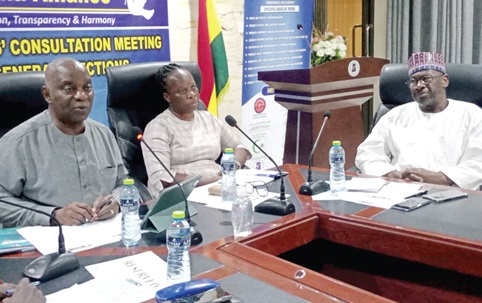
Let’s encourage citizens to vote on election day — Panellists
Panellists at a consultative meeting on the 2024 general election have called on the National Commission for Civic Education (NCCE) to step up its education to sensitise Ghanaians to the need to exercise their civic duty to vote in the elections.
That, they argued, was because of the fear of a high level of apathy in this year's polls.
They said some Ghanaians felt that their basic needs had not been met by politicians and so did not see the need to go and vote.
Personalities
The panellists who made the call were the Director of Training of the Electoral Commission, Michael Boadu; the Executive Director of the Star Ghana Foundation, Ibrahim-Tanko Amidu; the Co-chair of the Coalition of Domestic Election Observers, Rev. Dr Fred Deegbe, and the Deputy Director of Programmes of the NCCE, Modesta Annie Sapaty.
The meeting was organised by the FAITH In Ghana Alliance, a multi-faith platform, with support from Faith in Action International, the Electoral Commission, the NCCE and the Star Ghana Foundation.
It was attended by representatives of the Christian Council of Ghana, Ghana Pentecostal and Charismatic Council, Office of the National Chief Imam and the National Catholic Secretariat/Caritas Ghana.
The others are the Ahmadiyya Muslim Mission, the Knights and Ladies of Marshall, the Federation of Muslim Women Associations in Ghana, Catholic Religious Women and the Council of Independent Churches.
The National Faith Leaders Consultation Meeting on Ghana's 2024 elections was held in Accra last Tuesday to facilitate dialogue among diverse faith leaders.
Setting the tone for the discussions, Mr Boadu said: "What we think will affect the involvement of participation of the public in our activity is voter apathy and you hear ordinary Ghanaians say that they really can't make any difference between Party ‘A’ and Party ‘B’ and that their basic needs are still not met".
Hence, he said such believed there was no need to go and queue under the sun to vote.
The EC Director of Training encouraged the NCCE to reach out to the public and educate them on their civic responsibilities to get people to come out in their numbers to vote.
Alhaji Tanko said one of the most critical issues the country faced as it moved into this year's elections was mistrust of citizens in the institutions of state.
The current economic situation, he said, was also a factor that might affect participation.
"The current economic crisis is also a factor that might affect participation.
The high levels of youth unemployment are also a factor.
So all this combined creates a situation where if we don't redouble our efforts, there might be apathy," he said.
Rev. Dr Deegbe said the issues of apathy, disillusionment, cynicism and unemployment could be disturbing.
Power
The two political parties — the National Democratic Congress and the New Patriotic Party, received 98 per cent of votes cast, and while one wanted to stay in office the other was trying to recapture power “This coupled with unemployment, I see a critical factor in this duopoly to be moneycracy, morality going to the dogs, bribery, corruption, votes selling and vote buying,” Dr Deegbe added.
The Chairperson of FAITH In Ghana Alliance, Hajia Ayishetu Abdul-Kadiri, said the organisation was committed to promoting actions on inclusion, transparency and harmony.
She said its work since 2016 had created opportunities for enhanced collaboration among diverse faith groups, active civic engagement, social and behaviour change, and dialogue on critical development issues and added that it was currently active in 10 out of the 16 regions of the country.
